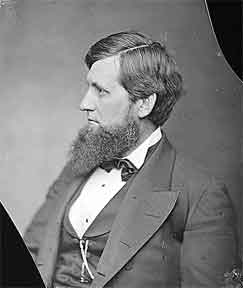William Allison

William Boyd Allison was born in Perry, Ohio on March 2, 1829. After graduating from Western Reserve University in 1849, he was admitted to the bar in 1852 and settled in Iowa in 1857. Becoming an active participant in Republican politics, he was elected to the US House of Representatives in 1862, where he promoted the interests of western developers and became an expert in transportation, tariffs and the budget. He was a strong radical in his early years in Congress, and supported the impeachment of President Andrew Johnson. Elected to the US Senate in 1872, he became a critical member, acting as chair of the Appropriations Committee from 1881 to 1908. He was an important figure in the passage of the Bland-Allison Act of 1878, which limited government purchase of silver, thus placing controls on the coinage of silver. A senior member of the Finance Committee, he played a major role in the drafting of the "Senate Substitute" to the proposed Mills Tariff Bill of 1888, which became the basis of the McKinley Tariff of 1890. He frequently came up as a candidate for the Republican nomination for President throughout the 1880s and 1890s, but had too little support to succeed in that endeavor. He remained in the Senate, increasing his power in that body. In 1897, he became chair of the Republican conference and the steering committee, and was able to push the Dingley Tariff through the Senate.
A practical politician skilled at bringing people together in agreement, he excelled at the behind-the-scenes compromises. Although he had many friends in both parties, and was a considered a wise, courteous, amiable man by most, his voting record revealed a staunch supporter of corporate interests. While he maintained cordial personal relations with President Theodore Roosevelt, Allison worked with the Republican "Big Four" (Senators Nelson W. Aldrich, John Coit Spooner and Orville H. Platt) to restrain the President’s attempts at reform. His final effort in Congress was to help bring about the compromise Allison Amendments to the Hepburn Railroad Act of 1906, thus making the issues of contention between President Roosevelt and Senator Aldrich sufficiently vague to facilitate the act’s passage. Allison died in Dubuque, Iowa, on August 4, 1908.
 >
>